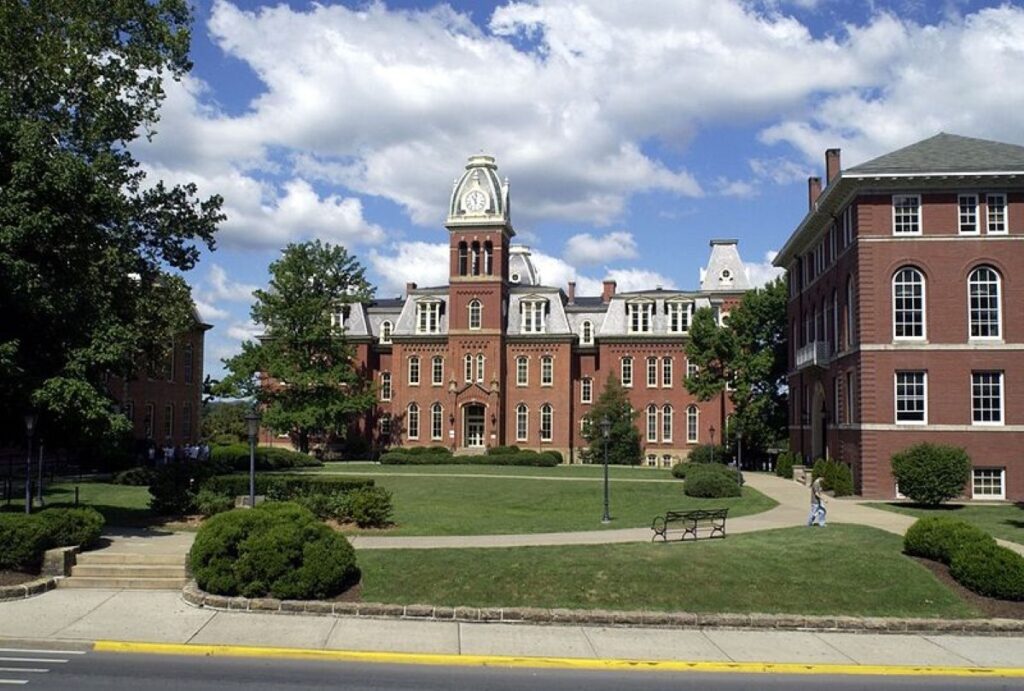West Virginia University’s ongoing review of more than two dozen programs has left many in the school’s community with questions that officials have tried to answer.
Monday morning West Virginia University announced that 25 of the school’s academic programs are under review with the possibility of discontinuation. The move comes amidst a financial crisis at the university, which last month announced $7 million in staffing cuts.
Monday afternoon, during a meeting of the West Virginia University faculty senate, faculty were given the opportunity to ask questions directly of university leaders including Provost Maryanne Reed and President Gordon Gee.
Daniel Totzkay, senator for the Eberly College of Arts & Sciences, asked where the process was headed.
“What is the specific vision for who WVU will be that the leadership has as a goal or eventual destination?” Totzkay asked.
President Gee said moving forward, the university was focused on being student centered, reaffirming its identity as a land-grant institution and differentiating WVU from other institutions of higher education.
“The vision for us is to be a very, very clearly focused institution on the things that we do well, the things that we need to do well and ultimately, the opportunity for us to really make a very clear difference in winning hearts and minds of the people of our state and if we do that I think will be will be will be an institution that is greatly valued,” he said.
Totzkay asked if Gee was implying that the university didn’t already focus on students or its land-grant mission.
“The students, when you take a look at the survey, they believe that we still need to do a lot more to engage with them personally, and to be engaged with them, not for our convenience, but for theirs,” Gee said. “And I hate to use this word, but the students are our customers. And we need to accept that as a responsibility.”
Tuesday morning the university published an open letter from the president, outlining a vision of an institution “that meets the needs of industry and our communities, while ensuring that we are differentiating ourselves in a competitive landscape.”
That includes a vision of WVU “as one of the elite R1 institutions in the country – emerging as a global leader in the areas of astrophysics, neuroscience, energy and sustainability, cancer prevention and treatment, and artificial intelligence and robotics.”
Stefania Staniscia, senator for the Davis College of Agriculture, Natural Resources & Design asked about the impact of cuts to the library budget on current students and faculty, as well as future applications.
WVU Libraries announced their spending on collections will be reduced by 8 percent in 2024. Those cuts include subscriptions to certain academic journals and a pause on new acquisitions.
“Will the lack of WVU faculty access to the most recent books and journals affect WVU research standings?” Staniscia asked. “Will persons responsible for the WVU budget consider transferring funds currently designated for athletic programs to academic programs, such as the library, in order that the university preserve its reputation as a leader that successfully educates undergraduate, graduate and medical students?”
Provost Reed responded by saying her office and the library system have been in contact about how to best serve the WVU community with a reduced budget.
“I’m pretty confident that we’re going to be able to serve most of the needs of our students and our faculty in doing so, but we have a budget challenge and we have to address that,” she said. “We’ve talked about the impacts that this is going to have on our personnel, and so we’re really looking for every opportunity to be efficient, but I do believe that our library’s going to be doing a very good job.”
Not asked in the formal conversations hosted by the university this week, but featured repeatedly on social media, is the question of why the focus has fallen so heavily on academic programs.
“We have bought 24 hospitals,” Gee said. “We have created a health system that is one of the best in the country in a very short period of time.”
But those purchases are an expense critics now question given the university’s $45 million budget deficit.
During a media availability Tuesday afternoon, WVU officials emphasized that the university’s academic transformation has been ongoing for more than a decade. Mark Gavin, WVU associate provost, acknowledged that the process has been accelerated by the COVID-19 pandemic.
“If you look over the last 10 years, while our colleges have seen some budget reductions and have adjusted to them, the non academic side of the house has also seen appreciable staffing reductions over time,” he said. “While it looks like the majority of the effort is focused on the academic side, and the colleges in particular, if you look at it over a longer timeframe, that’s not necessarily true. It’s taking a more balanced approach.”
Gavin says it is unclear what kind of financial impact the program review process will ultimately have.
The next step in the review process will be a Program Review Self-Study, where Deans and chairs of the identified programs will seek input from faculty and staff to be submitted to the provost’s office by Aug.1.
Recommendations for cuts will be made the week of Aug. 11 and then it will be up to the Board of Governors to confirm them in September.
Any layoff notices will be sent to individual faculty and staff the week of Oct. 16.




















